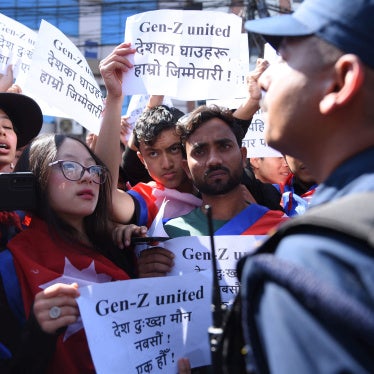In a new report issued today, Human Rights Watch calls for the dismissal of outstanding criminal charges against two staff members of the Cambodian League for the Promotion and Defense of Human Rights (Licadho). The Cambodian government must decide within weeks whether to proceed with the trial of the two, who could face ten years in prison if convicted.
Kim Sen and Meas Minear were arrested in December 1998 in connection with protests against the dumping of toxic waste in Sihanoukville, Cambodia. Detained for a month and then released, they were effectively accused of inciting the demonstrations, which turned violent. Human Rights Watch says the charges are groundless, and the two may have been targeted by a politicized court to pacify a powerful local politician whose house was vandalized by the protestors.
"Kim Sen and Meas Minear are the first Cambodian human rights defenders to face criminal charges since the creation of independent rights groups in 1992," said Sidney Jones, Asia director of Human Rights Watch. "Their arrest and detention were bad enough, but if their trial goes forward, it could have a chilling effect on freedom of expression and assembly throughout the country."
A subsidiary of the Formosa Plastics Group, Taiwan's largest private conglomerate, exported nearly 3,000 tons of mercury-contaminated industrial waste to Cambodia in late 1998. The shipment was dumped in an open field on the outskirts of Cambodia's southern port town of Sihanoukville, where poor local villagers scavenged the plastic coverings from the waste. Many villagers, as well as port workers who had unloaded the shipment, later complained of sickness; one port worker died but a lack of autopsy meant the cause of his death could not be established.
Amid widespread public outrage at the waste dumping, some Sihanoukville residents sought to exercise their constitutional rights. In December 1998, they held two days of public demonstrations, blaming government corruption for the presence of the toxic material. However, the demonstrations were not lawfully approved by the authorities and involved violence by some protesters, including the ransacking of several buildings.
A six-week Human Rights Watch investigation has found that Kim Sen and Meas Minear are being prosecuted for actions that were well within their human rights mandate: they gave advice on human rights and the law to disgruntled local citizens and actively observed the demonstrations in order to monitor any human rights violations that might occur.
As the late June 1999 deadline approaches for the Sihanoukville court to decide whether to proceed with a trial of Kim Sen and Meas Minear, Human Rights Watch urges the court to dismiss the charges for both lack of evidence and procedural violations of their rights.
As for the toxic waste dumping which provoked the riots, Human Rights Watch notes that the two human rights workers were treated more harshly by the authorities than those government officials who have since been charged with committing crimes for their role in allowing the toxic waste to be imported.
Human Rights Watch also expressed concern that the court investigation into the waste importation may be too limited to provide complete accountability for how the waste was allowed into Cambodia in the first place. The real test, therefore, will be whether ongoing investigations by the environment and finance committees of the National Assembly will be thorough and fully transparent. They should at least examine the serious allegations that high-level corruption was involved in the dumping decision.








